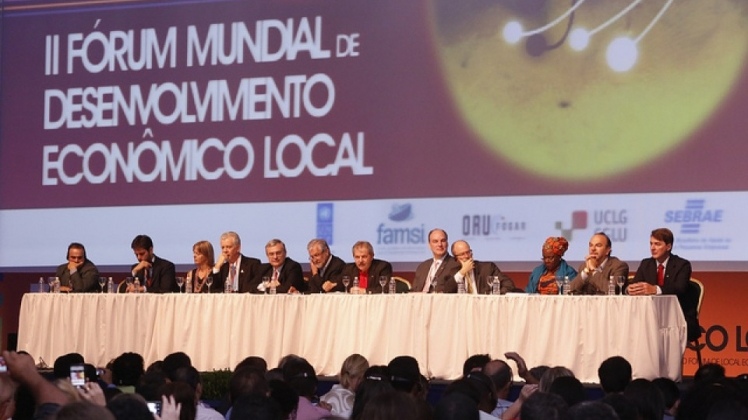
Brazil, Foz do Iguaço, 29 October – 1 November 2013
Organized by ITAIPU’s Technological Park, the Brazilian Micro and Small Business Support Service (SEBRAE), UCLG, FAMSI, ORU FOGAR and UNDP through the ART Initiative, the second World Forum on LED gathered the staggering number of over 4,300 representatives of national authorities, LRGs, universities, international cooperation associations, multilateral organizations, the private sector and civil society organizations from 67 countries.
Objectives
The objective of the Forum was to facilitate dialogue among representatives of national governments, local authorities and international cooperation partners, as well as between private and public enterprises, to discuss strategies and policies for an effective and inclusive LED. It was also aimed at fostering partnerships, identifying projects and facilitating South-South and DC agreements between participants, as a means to gather, share and replicate good practices in LED and to contribute to the construction of more solid, inclusive, and localized LED policies.
Highlights
Participants emphasized that LED has become an important element of sustainable development, key to the strategies that are to respond to long-term challenges and address the main bottlenecks of development.
To maximize LED’s potential and sustain its results, participants found that a territorial approach to development works best, that capacity reinforcement is a basic prerequisite, and that a consistent articulation between the local and national levels is a must. Indeed, giving more importance to the local dimension was seen as a requirement for a truly human and inclusive LED, where communities participate in the design of policies and in their implementation, through a bottom-up approach that incorporates gender equality and youth inclusion as cross-cutting elements.
The second World Forum on LED concluded with a final declaration entitled “Dialogue Between Territories” whose three main recommendations are:
- Participants call on national governments to promote decentralized public policies on LED as a means to improve living conditions in the territories.
- Participants acknowledge the fundamental role of local and regional governments in the implementation of development strategies and call on promoting their capacities.
- Participants acknowledge that LED strategies are based on public policies, and commit themselves to develop efficient and innovative instruments to implement LED policies in the territories.
Results
The Forums, as an ongoing process that promotes global dialogue on LED, are improving harmonization between the UN, LRGs, the private sector and civil society on LED issues, and generating more partnerships; this will eventually allow to better inform the global development agenda, in particular in relation to the new development framework. This endeavor is also crucial to advocate for the inclusion of LED in international events, therefore “making the case” for LED in the post-2015 agenda, as a key process that can contribute to its means of implementation. The Forums have also contributed to establishing a clear link between the practices on the ground and the global debates on LED, as well as to promoting exchanges of good practices and innovative experiences.
As a result of the processes unleashed in the first and second Forums, several key organizations (which include UNDP, ILO, UNCDF, UNWOMEN, UCLG, FOGAR, CLGF, FMDV, FAMSI, SEABRAE, ITAIPU, etc.) have agreed to launch a coordination mechanism to promote better coordination between different actors and more harmonization of LED interventions at the local and international level. The coordination mechanism will also facilitate the post-Forum process, allowing key institutional stakeholders to continue their cooperation for the promotion of LED. This will contribute to harmonizing LED policies and push forward concrete country-based interventions.
“The two World Forums on LED have generated unprecedented exposure and global dialogue around LED, and proposals for a more permanent global coordinating mechanism on LED.”
The conclusions and recommendations of the second Forum all constitute important contributions towards the third World Forum on LED, which will be held in 2015 in Turin (Italy).
_______________________________________________________
1 http://www.foromundialdel.org/video-del-ii-foro-mundial-de-desarrollo-economico-local/
2 http://www.foromundialdel.org/declaracion-de-foz-de-iguazu/
Articoli correlati


 “Good practices for beekeeping and food security”
“Good practices for beekeeping and food security”In Ramallah, on the 25th and the 26th May, National Beekeeping Forum of Palestine


 Habitat III Side Event : Making cities more equitable through inclusive economic development
Habitat III Side Event : Making cities more equitable through inclusive economic developmentGovernment and local representatives, NGOs, local businesses and United Nations Development Programme gather to discuss on the role of inclusive economic development









